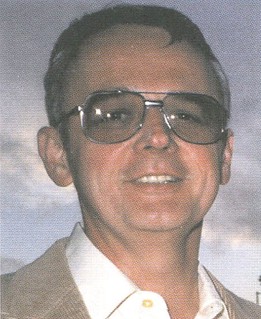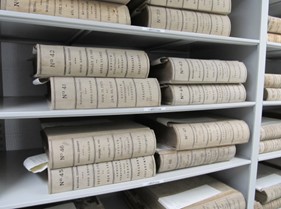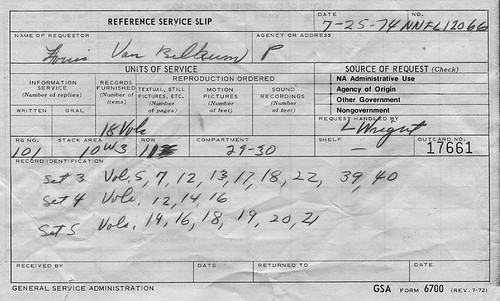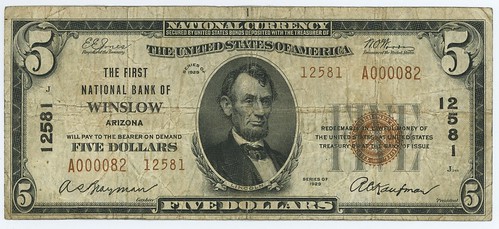
PREV ARTICLE
NEXT ARTICLE
FULL ISSUE
PREV FULL ISSUE
V25 2022 INDEX E-SYLUM ARCHIVE LOUIS VAN BELKUMWhile researching a book recently, I reached out to Peter Huntoon, who pointed me to a chapter he wrote about pioneer National Bank Note researcher Louis Van Belkum in the new Encyclopedia of U. S. National Bank Notes published jointly by the National Currency Foundation and Society of Paper Money Collectors. With permission, we're republishing it here. Thanks! -Editor
This book, which summarized a thumbnail history of every note-issuing national bank, also listed the final circulations for the banks. Lou abstracted the information from endless tables found in the 68 annual reports of the Comptroller of the Currency spanning 1863 through 1935. It became an instant buyer's guide for those of us chasing nationals, and was so successful it was reprinted in 1973. For the first time, we had some idea of what was out there and how much it totaled. But that was only the beginning of this man's monumental contribution to national bank note research. Over the next 11 years, from 1968 to 1979, he and his wife Barbara compiled the bank-by-bank issuance data for every note-issuing bank in the country. This Herculean task at last count involved tracking 12,631 different banks that issued 81,259 different sheet combinations over a period of 67 years. To compile this enormous trove of data, they had to sift through 410 huge ledgers housed at the National Archives, which were then located in Washington, DC, but now in College Park, Maryland.
At the time, Louis was a high school math teacher in Grand Rapids, Michigan. He and Barbara embarked on marathon driving trips to DC that typically lasted 3 or 4 days. Their typical pattern was to leave on a Friday and drive straight through for 11 hours with the two of them switching off on the driving. Once there, they hit the ground running at the National Archives, which involved frantically and doggedly writing by hand the information they gleaned from the ledgers. Upon returning home—another straight 11-hour drive—they then typed the information on 5 by 7-inch cards. This was no small task, especially for Lou because he was a two-finger typist. Ultimately, they assembled cards for all 12,631 issuing banks, many of which ran on for more than one card. They found it expedient to have microfilm made of certain crucial ledgers, which allowed Lou to pour over critical pages at home. He did not have to examine every ledger page for every bank. Rather he focused on the pages that captured series totals and the pages that spanned the Series of 1882 and 1902 date-back to post-date back changeovers. Most of this work was done in the National Archives reading room where they could work on ledgers that they checked out. The National Currency and Bond Ledgers still yield Lou's pull slips. A July 25, 1974 Louis Van Belkum National Archives pull slip for some National Currency and Bond Ledgers complete with his signature. This work was carried out for individual state collectors who would contract with him to compile information on a state or county basis at a fixed charge per bank. As the program gained momentum, the data was traded around and accumulated by both John Hickman and Lyn Knight. In time, Hickman convinced William Higgins of the Higgins National Bank Note Museum in Okoboji, Iowa, of the merits of these data, so after all other avenues were tapped out, Higgins sprang for the orphan states so Louis could complete the job.
The data became widely available in 1981 with publication of Don Kelly's
Along the way, in 1970, Louis collaborated with M. Owen Warns and Peter Huntoon to produce
the blue book of 1929 nationals, Van Belkum is known by us as Louis or Lou; however, within his family he went by Bill. He was born October 8, 1942 in Grand Rapids, Michigan, and named Louis William Van Belkum III. His odyssey into national bank notes started when he began collecting Michigan nationals in 1964. He sold most of his collection in 1976 through a Donlon auction but the last of his Michigan holdings came out in a June 3-5, 2009 Lyn Knight sale. Van Belkum assembled a state collection of $5 1929 nationals that was complete or virtually complete. This was his Arizona note He and Barbara moved to Las Vegas, Nevada, in February 1989 when he took a position with Clark County, where he served as a software programmer for their large IBM system. He retired in 2003. He became heavily involved in collecting casino chips while in Las Vegas. Lou succumbed July 31, 2013, to Alzheimer's disease at age 70, in Grand Rapids, to which he and Barbara returned in February 2010. He was survived by Barbara, his wife of 50 years, and his children Sandra, Paula and Louis William IV. Van Belkum's compilation of national bank note issuance data probably ranks as the largest single block of numismatic research ever undertaken by an individual and will forever loft him to the highest ranks of numismatic researchers. Every national bank note collector is in his debt.
For more information on the two organizations, see:
Wayne Homren, Editor The Numismatic Bibliomania Society is a non-profit organization promoting numismatic literature. See our web site at coinbooks.org. To submit items for publication in The E-Sylum, write to the Editor at this address: whomren@gmail.com To subscribe go to: https://my.binhost.com/lists/listinfo/esylum All Rights Reserved. NBS Home Page Contact the NBS webmaster 
|




